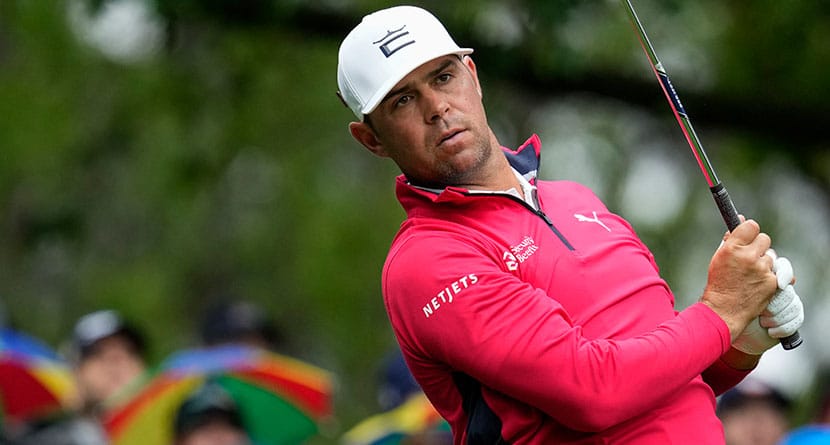HONOLULU (AP) — Gary Woodland arrived at the Sony Open and had a good night of sleep, meaning he didn’t jump out of bed and grab the side of the mattress to make sure he wasn’t falling out of the sky to his death.
He flew to Hawaii without worrying the overhead bin would crash down and kill him.
Fear and anxiety were unfamiliar terms to this rock-chalk solid, three-sport star from Kansas, a former U.S. Open champion whose only fear was not living up to his high standards.
All that changed the last week in April, when Woodland was at the Mexico Open and began to experience symptoms such as being jolted awake by unfounded fears, tremors in his hands, chills and low energy.
When he asked his doctor for something to calm the anxiety, that led to an MRI ordered to rule out Parkinson’s disease. Instead, it revealed a lesion on his brain on a tract that caused fear.
“That was the one that scared me the most,” Woodland said of his symptoms. “I’m a very optimistic person. I believe good things will happen. I was very fear-driven every day, mostly around death.”
Woodland played 10 tournaments with the symptoms, eight times on medication, seven times after the diagnosis. Remarkably, he made eight out of 10 cuts. But a summer of fear and medication gave way to the inevitable.
He had brain surgery on Sept. 18. Doctors cut a hole in the side of his skull the size of a baseball, big enough that it required 30 staples to close.
They didn’t get all of it — there was a risk of losing sight in his left side and the use of the left side of his body — but it was deemed successful on other counts. The tumor was benign and the feelings of fear were gone.
“The support from the tour, from people outside the golf world, has been tremendous for me and my family,” Woodland said. “When I woke up and realized I was OK, I was filled with thankfulness and love. That replaced the fear.
“It was very emotional because I had gone four-and-a-half months of every day really thinking I was going to die,” he said. “The doctors kept telling me I was OK, but this thing pushing on my brain … didn’t matter if I was driving a car, on an airplane, I thought everything was going to kill me. You can imagine leading up to surgery how I felt going into having my head cut open and operated on. The fear going into that was awful.”
The Sony Open, which starts at Waialae Country Club, begins the long road back. Woodland spent two days in the hospital and insisted in on walking out.
His wife, Gabby, gave the green light to Woodland to convert the dining room into a putting green in their Florida home. He was putting two days after surgery, no more than an hour a day because that was all the energy he had.
Woodland started swinging a club after five weeks — his father was in town to drive him to the course, just like when he was a teenager and playing high-level baseball, basketball and golf.
And then his doctor cleared him to travel and the first call was to Butch Harmon in Las Vegas.
“It’s so great, first off that he came through surgery and everything,” Harmon said. “Forget about playing golf — we didn’t know if he could make it. To come through it and get back to golf is a joy. He got a mulligan in life, a mulligan in his career.
“He’s come back and he’s worked hard,” Harmon said. “He has every opportunity to be a better player than he’s ever been. I’m still not sure about his stamina. This will be a great week.”
Waialae, located along the shores just around the bend from Diamond Head, is among the flattest courses on the PGA Tour. Woodland expects this week to provide an indication how well his brain will hold up over six days of focus and the usual stress golf brings.
Harmon said he knew Woodland was back to being his old self during one recent phone call after Woodland had another doctor’s visit.
“I asked him, ‘How did the consultation go?’ He said, ‘The doctor said it was the biggest brain he’d ever seen,’” Harmon said. “He was back to talking (smack) again.”
Harmon was in the dark as anyone about Woodland’s travails, only that he would play well only to have a big number or an inexplicable bad stretch of golf. Woodland said there were times he would be over a shot and forget which club he was hitting, or he would line up a putt and feel he was taking too long and then just whack it.
“Didn’t have the focus or energy,” he said.
How he fares in the first full-field tournament of the year will give him a reasonable expectation of where he is and how far he has to go. But he’s back playing. Fear has been replaced by sheer gratitude, and understanding the value of support.
“I just want to prove you can do hard things,” Woodland said. “I want to prove to my kids nobody is going to tell you you can’t do anything. You can overcome tough, scary decisions in your life. Not everything is easy.
“This came out of nowhere for me, but I’m not going to let it stop me.”




